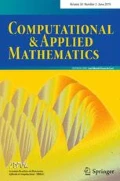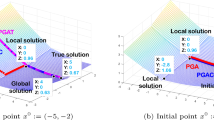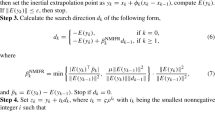Abstract
Recently, the left conjugate gradient (LCG) method has been developed and applied in many fields, such as computing physics and thermal pollution. As a typical \(Galerkin\) method, LCG is easy to get implemented and performs efficiently. LCG iteratively generates approximate solutions with residuals orthogonal to the Krylov subspaces. On the other hand, LCG lacks residual norm-minimization which is different from the famous generalized minimal residual method (GMRES). Although LCG and GMRES are based on different numerical principles, both algorithms exhibit similar behaviors in extensive computational experiments. To probe into the relationship between LCG and GMRES, we first demonstrate the mathematical equivalence of LCG and the full orthogonalization method (FOM). Then, the residual norm connection of LCG and GMRES is established as an easy consequence of relation between FOM and GMRES. Moreover, this paper presents two hybrid algorithms based on the LCG and GMRES. To unify the directness of LCG and optimality of GMRES, LCG residual norm-minimization (LCGR) algorithm is proposed. If orthogonalization is considered in the hybridization, LCG orthogonalization (LCGO) is designed. Numerical experiments show that two hybrid schemes do improve the performance of the standard LCG and GMRES, as well as the comparable methods such as nested GMRES (GMRESR) and generalized conjugate residual orthogonalization (GCRO).






Similar content being viewed by others
References
Arnoldi WE (1951) The principle of minimized iterations in the solution of the matrix eigenvalue problem. Q Appl Math 9:17–29
Bayliss A, Goldsten CI, Turkel E (1983) An iterative method for the Helmholtz equation. J Comput Phys 49:443–457
Brown PN (1991) A theoretical comparison of the Arnoldi and GMRES algorithms. SIAM J Sci Stat Comput 12:58–78
Calvetti D, Golub GH, Reichel L (1994) Adaptive Chebyshev iterative methods for nonsymmetric linear systems based on modified moments. Numer Math 67:21–40
Cao ZH (1997) A note on the convergence behavior of GMRES. Appl Numer Math 25:13–20
Catabriga L, Coutinho ALGA, Franca LP (2004) Evaluating the LCD algorithm for solving linear systems of equations arising from implicit SUPG formulation of compressible flows. Int J Numer Methods Eng 60:1513–1534
Catabriga L, Melotti B, Pessoa L, Valli AMP, Coutinho ALGA (2004) Comparison between GMRES and LCD iterative methods in the finite element and finite difference solution of convection–diffusion equation. In: Proceedings of the XXV Iberian Latin-American congress on computational methods in engineering, Recife, Brazil, 10–12, 2004
Cullum J, Greenbaum A (1996) Relation between Galerkin and norm-minimizing iterative methods for solving linear systems. SIAM J Matrix Anal Appl 17:223–247
Dai YH, Yuan JY (2004) Study on semi-conjugate direction methods for non-symmetric systems. Int J Numer Methods Eng 60:1383–1399
de Sturler E (1996) Nested Krylov methods based on GCR. J Comput Appl Math 67:15–41
Elman HC (1982) Iterative methods for large sparse nonsymmetric systems of linear equations. Computer Science Department, Yale University, New haven, CT
Gutknecht Martin H (1992) A completed theory of the unsymmetric Lanczos process and related algorithm, part I. SIAM J Matrix Anal Appl 13:594–639
Gutknecht Martin H (1994) A completed theory of the unsymmetric Lanczos process and related algorithm, part II. SIAM J Matrix Anal Appl 15:327–341
Liessen J, Rozloz̆ník M, Strakos̆ Z (2002) Least squares residuals and minimal residuals methods. SIAM J Sci Comput 23:1503–1525
Saad Y (1981) Krylov subspace methods for solving unsymmetric linear systems. Math Comput 37:105–126
Saad Y (1984) Practical use of some Krylov subspace methods for solving indefinite and nonsymmetric linear systems. SIAM J Sci Stat Comput 5:203–228
Saad Y, Schultz MH (1986) GMRES: a generalized minimal residual algorithm for solving nonsymmetric linear systems. SIAM J Sci Comput 7:856–869
Saad Y, Wu KS (1996) DQGMRES: a Quasi-minimal residual algorithm based on incomplete orthogonalization. Numer Linear Algebra Appl 3:329–343
Silva RS, Raupp FM, Almeida RC. A numerical methodology to solve thermal pollution problems. In: The 9th Brazilian congress of thermal engineering and sciences, Caxambu, Minas Gerais, Brazil, 1–12, 2002
Sleijpen GLG, van der Vorst HA, Modersitzki J (2000) Differences in the effects of rounding errors in Krylov solvers for symmetric indefinite linear systems. SIAM J Matrix Anal Appl 22:726–751
Van der Vorst HA, Vuik C (1993) The superlinear convergence behaviour of GMRES. J Comput Appl Math 48:327–341
Van der Vorst HA, Vuik C (1994) GMRESR: a family of nested GMRES methods. Numer Linear Algebra Appl 1:369–386
Wang LP, Dai YH (2008) Left conjugate gradient method for non-Hermitian linear systems. Numer Linear Algebra Appl 15:891–909
Wang LP, Yuan JY (2013) Conjugate decomposition and its applications. J Oper Res Soc China 1:199–215
Yuan JY, Gloub GH, Plemmons JR, Cecílio WAG (2004) Semi-conjugate direction methods for real positive definite systems. BIT Numer Math 44:189–207
Acknowledgments
L. Wang thanks Professor Yuan Jinyun and Professor Dai Yuhong for their useful suggestions on this paper.
Author information
Authors and Affiliations
Corresponding author
Additional information
Communicated by Jinyun Yuan.
The work is supported by the Fundamental Research Funds for the Central Universities (No. NZ2013211), China.
Rights and permissions
About this article
Cite this article
Wang, L., Zhu, Y. Hybrid methods based on LCG and GMRES. Comp. Appl. Math. 35, 301–319 (2016). https://doi.org/10.1007/s40314-015-0225-4
Received:
Revised:
Accepted:
Published:
Issue Date:
DOI: https://doi.org/10.1007/s40314-015-0225-4




